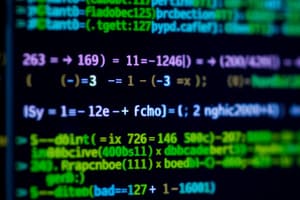Podcast
Questions and Answers
What is Relational Algebra?
What is Relational Algebra?
Basic set of operations for the relational model that enables a user to specify basic retrieval requests and form a new relation from one or more input relations.
Which of the following are operations of Relational Algebra? (Select all that apply)
Which of the following are operations of Relational Algebra? (Select all that apply)
- Insert (correct)
- Delete (correct)
- Select (correct)
- Average
What are the 3 steps in defining a database?
What are the 3 steps in defining a database?
Data model, Data Definition Language, Data Manipulation Language
What does the Select σ Unary Relational Operator do?
What does the Select σ Unary Relational Operator do?
Describe the Project π Unary Relational Operator.
Describe the Project π Unary Relational Operator.
What does the Rename ρ Unary Relational Operator do?
What does the Rename ρ Unary Relational Operator do?
Which operations are included in Relational Algebra operations from Set Theory? (Select all that apply)
Which operations are included in Relational Algebra operations from Set Theory? (Select all that apply)
What is the result of a Union (U) operation?
What is the result of a Union (U) operation?
Explain the result of an Intersection (∩) operation.
Explain the result of an Intersection (∩) operation.
What does the Difference (-) operation do?
What does the Difference (-) operation do?
What happens in a Cartesian Product (X) operation?
What happens in a Cartesian Product (X) operation?
Which operations are considered Binary Relational Operations? (Select all that apply)
Which operations are considered Binary Relational Operations? (Select all that apply)
What is the function of the Join ⋈ operation?
What is the function of the Join ⋈ operation?
Flashcards are hidden until you start studying
Study Notes
Relational Algebra Overview
- Relational Algebra constitutes operations for the relational model allowing retrieval requests and formation of new relations.
- It forms the foundation for querying databases efficiently.
Operations on Relations
- Two categories of operations exist:
- Update Operations: Include insert, delete, and modify functions.
- Retrieval Operations: Cover select, project, join, union, intersection, difference, cartesian product, and divide.
Database Definition Steps
- Three essential steps for defining a database:
- Establish a data model.
- Utilize a Data Definition Language (DDL) for defining the database structure.
- Implement a Data Manipulation Language (DML) for data handling.
Unary Relational Operations
- Key unary operations include:
- Select (σ): Retrieves specific tuples from a relation based on given conditions.
- Project (π): Filters specific attributes while discarding others.
- Rename (ρ): Changes the names of attributes or relations.
Select (σ) Operation
- Used to select subsets of tuples fulfilling a condition.
- Results maintain all attributes from the original relation.
- Commutative property: Order of operations does not affect results.
- Output size is ≤ input size.
- Example queries:
- Select employees whose department number is four.
- Select employees with a salary greater than 30k in department four.
Project (π) Operation
- Retains certain columns while removing others, creating a vertical partition of data.
- Non-commutative: The order in which attributes are listed affects the outcome.
- Eliminates duplicate tuples with no added conditions.
- Result size is ≤ input size, matching input if a key is included.
- Example query: Project first name, last name, and salary of all employees.
Rename (ρ) Operation
- Allows for renaming attributes and relations.
- Can rename attributes to new names and change a relation's name.
- Flexible in employment, addressing both individual attributes and entire relations.
Set Theory Operations in Relational Algebra
- Key operations derived from set theory encompass:
- Union (U): Combines relations, eliminating duplicates.
- Intersection (∩): Retrieves tuples common to both relations.
- Difference (-): Identifies tuples in one relation excluding those in another.
- Cartesian Product (X): Merges tuples from two relations without type compatibility requirements.
Union (U)
- Combines two relations under compatibility conditions.
- Eliminates duplicate tuples to ensure uniqueness within the result.
Intersection (∩)
- Captures only those tuples present in both relations, akin to the intersection of sets.
Difference (-)
- Produces tuples exclusive to the first relation by subtracting those in the second.
- Not commutative: Order of relations affects output.
Cartesian Product (X)
- Generates combinations of tuples from two relations.
- The number of resulting tuples is the product of the tuple counts in the two relations.
- Typically used in conjunction with the SELECT operation for meaningful data retrieval.
Binary Relational Operations
- Two fundamental binary operations are:
- Join (⋈): Integrates cartesian product with select to extract relevant tuples.
- Division (÷): Utilized to determine relationships fulfilling specific criteria between two sets.
Join (⋈) Operation
- Acts as a combination of cartesian product and select functions.
- Retries all tuples unless limited by conditions.
- Useful for extracting relational data, such as department managers.
Studying That Suits You
Use AI to generate personalized quizzes and flashcards to suit your learning preferences.




